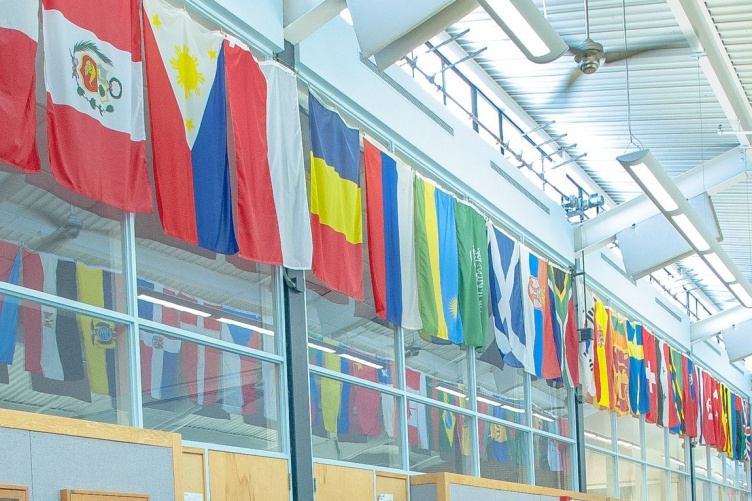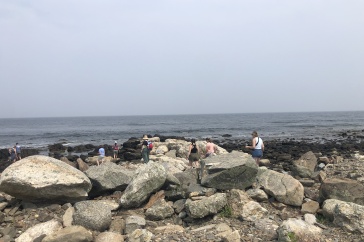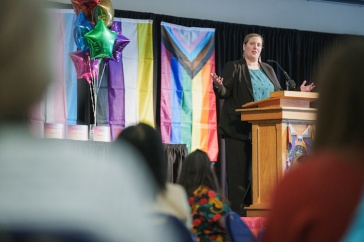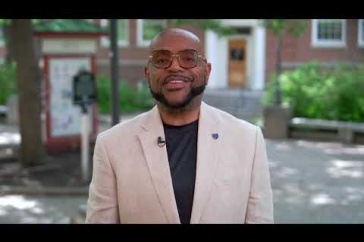
On Wednesday, when members of the UNH community gathered on T Hall lawn to stand in unity against President Donald Trump’s executive order banning people from seven predominantly Muslim countries from entering the U.S., a native of Iran who received his doctorate at UNH was there. The fact that he is from Iran, he says, wasn’t the point.
“I want to emphasize this is not just a personal concern for me. I would be protesting the ban even if I was exempt from it,” says the man, who requested not to be identifed by name. “Among the reasons people like me decided to move to this country was the promise of equal opportunity for everyone, the promise of not judging people based on their skin color or country of origin. Now those promises do not look credible anymore,” he says.
Universities across the country are already feeling the effects of Trump’s Jan. 27 order to close U.S. borders to people from Iran, Iraq, Syria, Sudan, Libya, Yemen or Somalia for at least 90 days. Syrians are banned indefinitely. The measure is aimed at blocking potential terrorists from entering the country.
“Among the reasons people like me decided to move to this country was the promise of equal opportunity for everyone.”
Here at UNH, the ban means two researchers from Iran and another international scholar can’t get visas to come to Durham. For students from any of those countries, it means planned visits from their families will not happen during the next three months. And, should the ban be extended, there may be graduates whose families won’t be here to witness the culmination of their hard work. “I can’t go home and (if the ban stays in place) my family can’t come for graduation,” says the Irani doctorate.
What’s more, the executive order also means a potential compromise of scholarship.
“One of the things that makes UNH and other U.S. universities competitive, world-class institutions is the ability to attract the best and the brightest students and faculty from around world,” says Jeannie Sowers, associate professor of political science and international affairs program director. “We have scientists, doctors and technical experts here and from other countries working together. This ban affects the university’s free flow of people and ideas. It hurts our core mission of teaching and research and violates the norms the university tries to uphold.”
Svetlana Peshkova, associate professor of anthropology, agrees. “Cross-cultural exchange is an integral part of our mission at UNH. One student, one faculty member or one staff member lost because of this ban is one too many,” she says. “As faculty, we not only teach students about the world by trying to bring it to them in and out of the classroom, and encourage them to go to other countries and communities different from their own, we also are ethically responsible to share with the world the knowledge that we have — to participate and foster the exchange of ideas globally. I believe the ban undermines our mission at its core.”
UNH has 1,170 international undergraduate and graduate students between the Durham campus, UNH Law and Manchester, according to the Office of International Students & Scholars (OISS). Nearly 60 students, faculty and staff are from one of the banned countries.
“There is so much to this — there could be so many ramifications — we haven’t had time to digest it all,” says Leila Paje-Manalo, OISS director. “Our goal right now is to share information and, if we can, prevent misinformation from being spread.”
At the same time, they want students to know the risks, noting an international scholar decided to go home and not continue his work at UNH knowing he likely won’t be able to come back. “His decision was totally cemented by what’s going on right now,” Paje-Manalo says. “He had the opportunity to extend.”
For undergraduates who might otherwise have returned home for the summer, leaving may not be an option.
“We would recommend that students who are here from the seven countries in the ban not leave the U.S.,” says Erin Corcoran, professor of law at UNH Law. “Unless they aren’t planning on returning, they shouldn’t leave.”
Noting parents from the banned nations won’t be able to visit their students while the executive order is in effect, she adds, “We are looking at potential family separation. There is a lot of uncertainty right now, and it’s causing people a lot of anxiety.”
She cited a staff member from outside the U.S. whose spouse is due to visit next week. While neither is from one of the banned countries, there is still concern about the visit. “Until he gets here, she is going to be worried. This is causing people undue stress,” Corcoran says. “It’s hard to work, hard to study.”
For international graduate students, it may be hard to do both. “If a graduate student received a grant from UNH and can’t get here in time, the money might end up going to someone else,” says Elizabeth Webber, OISS associate director. “It’s a big domino effect.
"A lot of these students feel trapped. They’re being told if they do travel, they may not be able to come back. They are waiting for the other shoe to drop. There’s the fear their education is going out the window, that they might not be able to get jobs.”
According to the Association of Public and Land Grant Universities, of which UNH is a member, more than 17,000 students from the seven banned countries attended U.S. universities during the 2015-16 school year.
“One student, one faculty member or one staff member lost because of this ban is one too many.”
“Simply assuming your country of origin determines who you are, and that everyone from that country is a threat, is going to have a chilling effect,” Sowers says. “It’s counter to everything we do. Saying that all people coming from one particular country are suspect is wrong. Discrimination on the basis of national origin or religion is always wrong.”
Corcoran notes she is part of a network started by the New Hampshire Civil Liberties Union to connect students with a lawyer if they have concerns about the ban. “We want to provide students with the information they need and make sure people have the facts, know what’s going on and that rumors get squelched,” she says.
UNH President Mark Huddleston issued two emails this week addressing the effects of the ban, saying he has expressed his concerns with the state's congressional delegation and that the university supports its international community.
The ban also suspends the U.S. Refugee Admissions Program for 120 days. Federal judges in Boston and New York, among other cities, have blocked parts of the executive order.
“Being an immigrant myself, I empathize with and stand in solidarity with anyone who is singled out by the ban, their families and their friends, whether they are our students, faculty, staff or not. We are all affected in different ways and to different degrees; if we do not want it to happen to us, it should not be happening to anyone else,” Peshkova says.
-
Written By:
Jody Record ’95 | Communications and Public Affairs | jody.record@unh.edu

















































